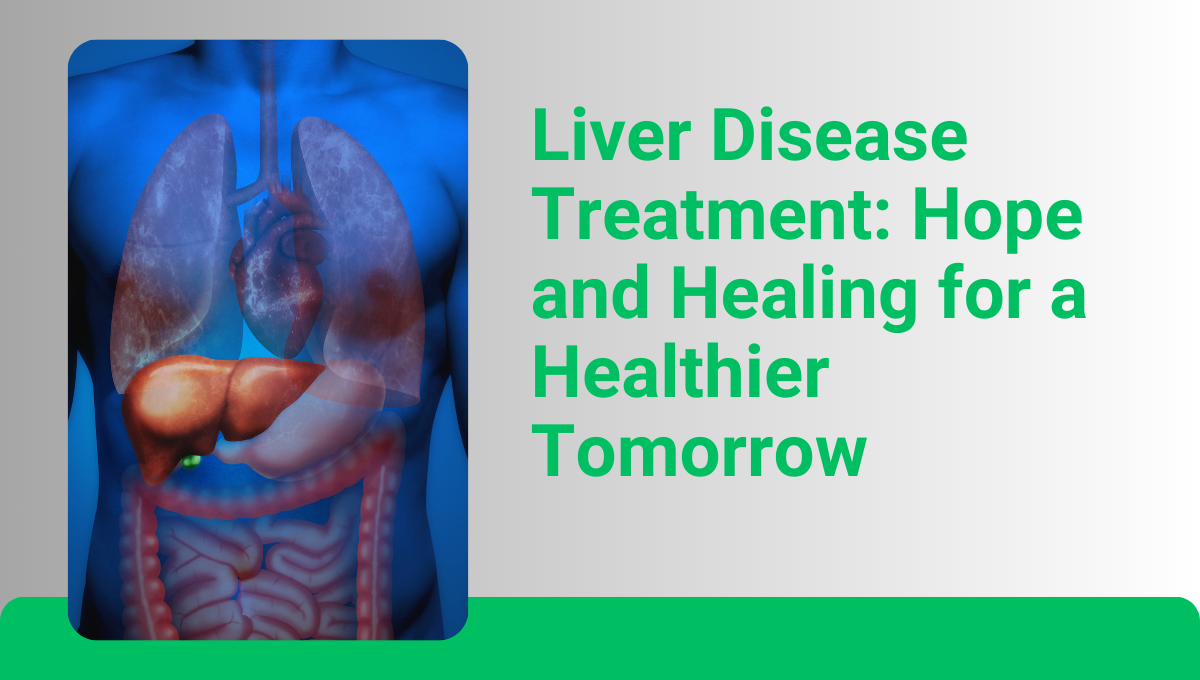Liver Disease Treatment: Hope and Healing for a Healthier Tomorrow
Description: –
The liver is an incredible organ, capable of astonishing regeneration and serving a wide variety of crucial purposes in the human body. However, if it gets sick, it might be a huge obstacle to overcome. Fatty liver disease, hepatitis, and cirrhosis are all forms of liver disease; each has its own set of symptoms, diagnosis, and treatment options. In this extensive article, we will delve into the field of liver disease treatment, discussing its history, current state, and the promise it has for a better tomorrow.
1# Liver Disease Treatment: A Better Understanding

Having a foundational knowledge of liver illness is essential before diving into therapy possibilities. The liver is critical for proper functioning of the body due to its roles in metabolism, detoxification, and protein synthesis. Several broad categories exist for liver diseases:
1) The accumulation of fat in liver cells is the hallmark of fatty liver disease, which is linked to both obesity and heavy alcohol intake
2) Liver disease is frequently caused by hepatitis viruses (A, B, C, D, and E). If untreated, it can cause irritation and permanent harm
3) Cirrhosis is a progressive scarring (fibrosis) of the liver that reduces liver function and is caused by a wide variety of illnesses and disorders, including hepatitis and chronic drinking
4) Chronic liver illness is linked to the development of liver cancer, which requires a diagnosis for effective treatment
5) Liver diseases caused by an immune system attack include autoimmune hepatitis, primary biliary cirrhosis, and primary sclerosing cholangitis.
2# Strategies for Liver Disease Treatment

Liver disease Treatment options for liver illness are highly condition- and severity-specific. In this article, we will discuss several of the most typical therapeutic methods:
- Changes in Ways of Life in Liver Disease

1) Fatty liver disease can be helped by making dietary and lifestyle changes such as losing weight, eating healthier, and drinking less.
2) Abstinence from Alcohol: People who have alcoholic liver disease should not drink alcohol.
B) Medications In Liver Disease Treatment
- Antiviral medications can be used to treat and sometimes even eliminate viral hepatitis, including Hepatitis B and C.
2) Immunosuppressants are used to treat autoimmune liver disorders by decreasing immune system activity directed at the liver

Getting a New Liver in Liver Disease Treatment
A liver transplant may be the only effective treatment for severe liver disease when liver function has been severely compromised and cannot be regained. Success rates after transplants have increased thanks to technological advancements in the field.
D) Liver cancer treatment based on specific targets:
Depending on the stage of the disease and the patient’s general condition, a variety of treatments, including targeted medicines, immunotherapy, radiation therapy, and surgical resection, may be considered for liver cancer.
E) Handling Difficulties In liver diseases
Ascites (abdominal fluid accumulation), hepatic encephalopathy (cognitive impairment related to liver illness), and variceal bleeding (bleeding from esophageal adenocarcinoma) are all problems that must be managed throughout treatment.
F) The Importance of Positive Thinking in Healing Liver Diseases
Hope is an important part of treating liver disease. Liver illnesses are difficult to manage, and many individuals struggle after receiving a diagnosis. But the progress in medicine has given people with liver problems fresh hope.
3# Improvements in Healthcare in Liver Disease Treatment:

1) Therapies for liver illnesses are now available thanks to scientific research and technical progress. With improved cure rates and fewer negative effects, new antiviral medicines have changed the way hepatitis is treated
2) There is renewed optimism for better results and enhanced quality of life in the treatment of liver cancer because of the introduction of targeted treatments and immunotherapies. Improved
3) Prevention through Quick Diagnosis The effectiveness of treatment for illnesses of the liver can be enhanced with routine screening and early diagnosis. Since preventative measures against Hepatitis A and B are now available, fewer people are becoming infected.
4) Care that helps:
There is renewed optimism for those living with liver illness thanks to advances in supportive care and the management of complications.
The Triumph of Transplantations
High success rates and an increasing number of organ donors have made liver transplantation, formerly considered a last resort, a feasible choice for many patients.
4# The Prospective Treatment of Liver Disease
The field of liver disease treatment has bright prospects:
a) DNA Editing
The possibility of a permanent treatment for genetic liver illnesses is being fostered by research into their potential correction by gene therapy.
b) Devices for a Synthetic Liver:
To bridge the gap between the need for a liver transplant and the patient’s eventual recovery, researchers are working on artificial liver devices.
C)Therapeutic Individualization:
Because each patient’s genetic makeup and disease presentation is different, advances in personalized medicine may one day lead to individualized treatment options.
d)Science of Regeneration:
The amazing ability of the liver to regenerate damaged tissue is the focus of current regenerative medicine research.
5# Conclusion
The therapy for liver illness has come a long way, providing people with hope and healing. Liver illnesses can be treated in a variety of ways, from modifying one’s lifestyle and taking medicine to undergoing a transplant and using novel therapies. Improved treatment outcomes and renewed optimism for a healthier tomorrow are the results of early detection, prevention, and continued research.
The best course of treatment for liver illness should be determined after discussion with a medical practitioner, who should be consulted if you or a loved one have been diagnosed. Those who have suffered from liver illnesses can take heart in the fact that, thanks to scientific progress and the challenging work of healthcare professionals, a better future is on the horizon.

